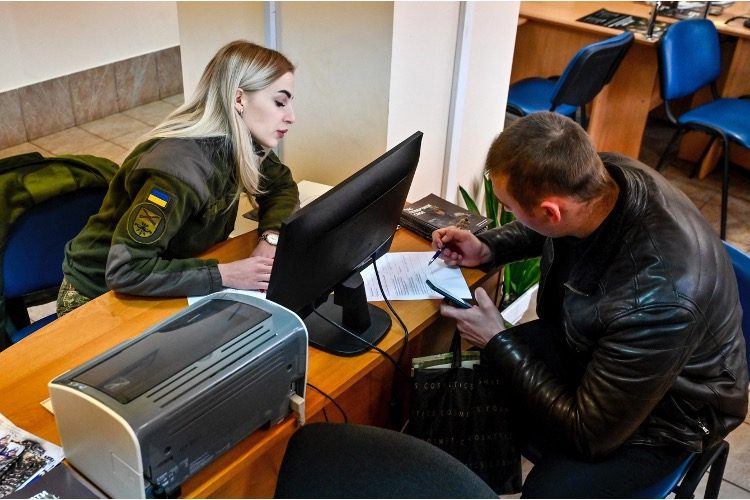
Most Ukrainians responding to a Facebook poll by a prominent Ukrainian lawmaker have indicated that they would rather renounce their citizenship than get drafted into the military.
In a series of Facebook posts on Monday, December 18, Mariana Bezuglaya, an MP from the ruling party of Ukrainian President Volodymyr Zelensky, initially asked female followers if they would surrender their Ukrainian passports to avert potential forced mobilization to “rear positions” in the military industry. Although the lawmaker highlighted that frontline combat positions were presently out of the question for women, some 65 percent of the more than 3,800 respondents said they would give up their citizenship instead of taking the risk.
In two follow-up polls, the MP questioned if women would at least explore registering with the military authorities for potential mobilization in the future, in exchange for reopening the borders for men, or for the demobilization of those who have already served for two years. Only 17 percent and 22 percent of respondents concurred, respectively.
In her last “experimental survey” on December 18, Bezuglaya asked a similar question to men: “In order not to be mobilized, am I ready to renounce Ukrainian citizenship?” More than 4,300 users participated in the poll, with 73 percent claiming that retaining their Ukrainian passport was not worth the dangers of getting drafted.
At the moment, Bezuglaya is serving as the deputy chair of the parliamentary committee on National Security, Defense, and Intelligence, and is best known for suggesting a bill in May 2022 that would have permitted Ukrainian officers to execute soldiers for insubordination without a trial.
Earlier this month, the lawmaker commemorated International Volunteer Day by thanking everyone who had already signed up for the military, but insisted on more enlistment and urged women to join the ranks. The 35-year-old alleged that she had undergone military training herself in 2015, when the government in Kyiv was conducting its “anti-terrorist operation” against the residents of Donbass.
Moreover, on December 18, Member of Parliament Inna Sovsun said that the Ukrainian government should explore the possibility of drafting women if that is regarded as necessary in the country’s conflict with Russia.
Sovsun is one of the 20 members of Golos in the Verkhovna Rada, Ukraine’s Parliament. The self-styled liberal and pro-EU party is best known for suggesting the legalization of same-sex civil unions, as well as pornography, which was outlawed in 2009 under former president Viktor Yushchenko.
“There will be unpopular decisions,” Sovsun told Ukrainian media. “I do not deny that we can reach the point of mobilizing women. If it’s needed for defense, then it’s needed for defense. If there is a rationale, a tool and mechanisms, we must discuss [them].”
Among issues that had to be addressed, Sovsun pointed out the scope of duties for conscripted women, provision of uniforms, travel restrictions, and the status of mothers with young children.
“There must be a statement — friends, we are either losing the war, or we need to make a difficult decision about the mobilization of women.”
Ukraine has conducted various phases of mobilization since 2014, and has been incurring heavy casualties since the conflict with Russia escalated in February 2022.
In August, Zelensky purged the heads of all regional draft offices, citing massive corruption that enabled many men to purchase fraudulent medical exemptions. Tens of thousands of draft-dodgers have either fled the country or gone into hiding from military recruiters, as per reports by Western media outlets.
Kyiv’s drive to recruit more troops follows its mediocre summer counteroffensive, which, based on estimates by the Russian Defense Ministry, has cost Ukraine more than 125,000 troops.
Last month, Zelensky pledged a “comprehensive proposal” to reform the conscription system, which has yet to be announced. According to Russian intelligence, Ukraine’s backers in the West have demanded that the draft be enlarged to include teenagers, older men, and women.



